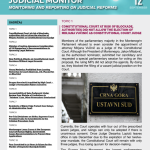
SELECTION OF CONSTITUTIONAL COURT JUDGES IS AN IMPORTANT STEP FORWARD
08/10/2025
Number 12: Judicial Monitor – Monitoring and Reporting on Judicial Reforms
08/10/2025UN COMMITTEE ON ENFORCED DISAPPEARANCES PUBLISHES CONCLUDING OBSERVATIONS ON MONTENEGRO

On October 7, the UN Committee on Enforced Disappearances (CED) published its concluding observations on Montenegro, following the review of the state report on the implementation of the International Convention for the Protection of All Persons from Enforced Disappearance during its recent session.
The conclusions contain the Committee’s main concerns and recommendations regarding the implementation of the Convention, while also highlighting positive developments.
Regarding Montenegro, the Committee welcomed the adoption of the Guidelines for the Search for Missing Persons and the War Crimes Investigation Strategy for the period 2024–2027.
It noted the adoption of amendments to the Law on Veterans’ and Disability Protection, through which all missing and killed civilian victims of armed conflicts from the 1990s in the territory of the former Yugoslavia were recognized as civilian war victims, and their family members were granted monthly financial compensation. It also took into account that in 2025, the state provided one-time financial assistance of €100,000 to 16 identified families in the Murino, Tuzi, Štrpci, and refugee deportation cases, and that Guidelines on Compensation for Victims are currently being drafted.
At the same time, the Committee expressed concern over the limited progress in clarifying the fate and whereabouts of missing persons, identifying their remains, and the excessive delays in investigations and prosecutions in war crimes cases.
The Committee recommended that Montenegro strengthen regional cooperation to facilitate the exchange of information and evidence aimed at locating and identifying missing persons, as well as investigating all cases, prosecuting those suspected of crimes, and providing support to victims.
The Committee expressed concern that existing reparation measures only include financial compensation, which victims can obtain solely through civil litigation. It also raised concerns over the postponed implementation of the Law on Compensation for Victims of Criminal Offences until Montenegro joins the EU, as well as the obstacles faced by the relatives of missing persons and victims of war crimes in exercising their right to compensation.
The Committee urged Montenegro to ensure that every person who has suffered harm related to enforced disappearance has access to a comprehensive reparation program, even in cases where no criminal proceedings have been initiated.
It also recommended that Montenegro promptly implement the Law on Compensation for Victims of Criminal Offences and remove obstacles that limit access to compensation for the relatives of missing persons, including statutes of limitations, and ensure they are treated equally as victims of war crimes.
The Committee reiterated its recommendation that Montenegro amend the Criminal Code to explicitly define enforced disappearance as a separate and independent criminal offense, with a statute of limitations that is long and proportionate to the seriousness of the crime—starting only from the moment the act ceases. There is already an opportunity to fulfill this recommendation, as a Draft Law on Amendments to the Criminal Code is currently under parliamentary consideration.
The Committee also recommended amendments to the Law on Free Legal Aid to enable victims of enforced disappearances to exercise their right to free legal assistance. Furthermore, it called for ensuring that the legal status of missing persons and their relatives in areas such as social protection, family, and property law can be regulated without having to declare the missing person as deceased, including the establishment of a special procedure for declaring a person missing due to enforced disappearance.
Human Rights Action (HRA) will continue to monitor the implementation of these recommendations and actively advocate for their full realization.
The Committee’s concluding observations are available in English at:
https://tbinternet.ohchr.org/_layouts/15/treatybodyexternal/Download.aspx?symbolno=CED%2FC%2FMNE%2FOAI%2F1&Lang=en







 English
English